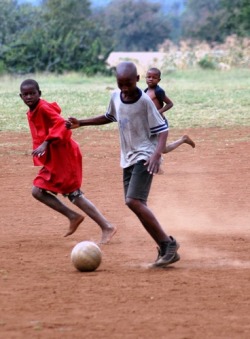Soccer: the new Religion
JUJU: BEYOND THE FIELD
http://amanikids.org/amani-photo-history/2006

The physical game on the field is just the beginning of soccer. This statement is extremely true in the country of Tanzania. In this country, soccer involves the active practice of witchcraft. As a sociologist at the University of Dar-es-Salaam (in Tanzania) reveals, juju (witchcraft) is just as responsible for a victory in soccer as is possessing excellent soccer skills. "Witchdoctors in Dar-es-Salaam agree that training is important for [soccer] players... to have a better chance of winning. But in addition to that there must be witchcraft - 'Huweza kushinda bila ya uchawi' (you can't win without witchcraft), the witchdoctors say" (Armstrong 160).
The belief is so strong that it is common to hear stories about whole teams visiting witchdoctors before matches and participating in witchcraft rituals within the context of soccer. In one incident, a local soccer team was identified as having buried a goat in order to ensure a victory over a visiting rival team. The night before the match, members of the local team placed a live goat right at the gate where the soccer players would enter the field. The belief was that the goat would drain the strength and endurance of the other team when they walked over it. The host team won. The victory was quickly identified as a product of the witchcraft. Yes, talent and skill were necessary for the match. However, the difference was seen as being that one team practiced witchcraft while the other did not (Armstrong 160-161).
So how did juju invade the sport of soccer? Its roots trace back to the colonial period (1896-1961) when the Germans and British tried to control the use of witchcraft. Traditional games and dances were prohibited and looked at unkindly. Many individuals were killed during this period because of their involvement with the local practices. Believing modern sports would civilize the locals, soccer was introduced to the region. However, soccer soon became the new arena for witchcraft, ultimately establishing itself as a critical aspect of the sport ( Armstrong 161).
For Tanzania, as in many other African countries, soccer is thoroughly a religious phenomenon. It has become a ritualized event that serves to not only win matches but identify a society. Juju is unique to the Tanzanian people. As such, it reflects the moral and social standards of a people. It reveals how they not only play soccer but how they view life.
The belief is so strong that it is common to hear stories about whole teams visiting witchdoctors before matches and participating in witchcraft rituals within the context of soccer. In one incident, a local soccer team was identified as having buried a goat in order to ensure a victory over a visiting rival team. The night before the match, members of the local team placed a live goat right at the gate where the soccer players would enter the field. The belief was that the goat would drain the strength and endurance of the other team when they walked over it. The host team won. The victory was quickly identified as a product of the witchcraft. Yes, talent and skill were necessary for the match. However, the difference was seen as being that one team practiced witchcraft while the other did not (Armstrong 160-161).
So how did juju invade the sport of soccer? Its roots trace back to the colonial period (1896-1961) when the Germans and British tried to control the use of witchcraft. Traditional games and dances were prohibited and looked at unkindly. Many individuals were killed during this period because of their involvement with the local practices. Believing modern sports would civilize the locals, soccer was introduced to the region. However, soccer soon became the new arena for witchcraft, ultimately establishing itself as a critical aspect of the sport ( Armstrong 161).
For Tanzania, as in many other African countries, soccer is thoroughly a religious phenomenon. It has become a ritualized event that serves to not only win matches but identify a society. Juju is unique to the Tanzanian people. As such, it reflects the moral and social standards of a people. It reveals how they not only play soccer but how they view life.
This video contains no visual footage. It is strictly audio. It is a sample of some of the chants and songs used in witchcraft not only in Tanzania but also in Kenya.
